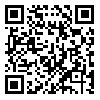Volume 23, Issue 90 (11-2023)
refahj 2023, 23(90): 259-291 |
Back to browse issues page
Download citation:
BibTeX | RIS | EndNote | Medlars | ProCite | Reference Manager | RefWorks
Send citation to:



BibTeX | RIS | EndNote | Medlars | ProCite | Reference Manager | RefWorks
Send citation to:
malekzadeh A, aslami E, arami M. (2023). Designing a causative model of addiction relapse of married addicts based on personality and employment status with the mediator role of marital satisfaction. refahj. 23(90), 259-291. doi:10.32598/refahj.23.90.4212.1
URL: http://refahj.uswr.ac.ir/article-1-4145-en.html
URL: http://refahj.uswr.ac.ir/article-1-4145-en.html
Abstract: (2937 Views)
Introduction: Addiction is one of the issues that can affect different aspects of a person's life and those around them. The addiction of this scourge of women, even when it is treated, the probability of its recurrence is very high. In many studies, although attention has been paid to the phenomenon of addiction and the factors affecting it; But less attention has been paid to the causes and factors affecting its recurrence. Based on what was said, the purpose of the current research was to present a causal model of married addicts' relapse based on personality and permanent employment with the role of mediator of marital satisfaction.
Method: The research method was a description of the type of correlation and the statistical population included all recovered addicts who are members of the human rehabilitation population of the 60th Congress of Shahrekord. The statistical sample was 250 people from this group, who were selected on the basis of their availability, and used questionnaires of Neo's personality traits (McCree and Costa, 1992), Enridge's marital satisfaction (Foures and Elson, 1989) and the prediction of relapse to drug use (Wright and et al., 1993) responded.
Findings: The findings showed that the direct effect of neuroticism, extroversion, openness to experience and agreeableness on addiction relapse of addicts is positive and significant, and responsibility has a negative and significant effect on addiction relapse. The direct effect of job status on relapse of addiction is negative and significant. The direct effect of marital satisfaction on addiction relapse is negative and significant. The indirect effect of personality characteristics and job status on the relapse of addicts is significant. The causal model of addiction relapse of married addicts based on personality and permanent employment with the mediator role of marital satisfaction had a good fit. The results show the effect of personality, marital satisfaction and job status on addiction relapse.
Discussion: According to the findings of the research, it can be said that in order to prevent the return of addiction, the differences of people in terms of personality should be considered. Because having personality problems and not intervening in this case can make a big contribution to the relapse of addiction. Another important factor that can be effective in the relapse of addiction is marital satisfaction. Counselors and therapists should deal with the factors affecting marital satisfaction and its increase in addition to addiction treatment, because according to the results of the present research, the probability of relapse of addiction increases with the decrease of marital satisfaction. However, having a permanent job is one of the components that indirectly It is effective both on addiction relapse and marital satisfaction. Therefore, in order to reduce the return of addiction, governments and society must first of all provide the occupation of the person and his job security
Method: The research method was a description of the type of correlation and the statistical population included all recovered addicts who are members of the human rehabilitation population of the 60th Congress of Shahrekord. The statistical sample was 250 people from this group, who were selected on the basis of their availability, and used questionnaires of Neo's personality traits (McCree and Costa, 1992), Enridge's marital satisfaction (Foures and Elson, 1989) and the prediction of relapse to drug use (Wright and et al., 1993) responded.
Findings: The findings showed that the direct effect of neuroticism, extroversion, openness to experience and agreeableness on addiction relapse of addicts is positive and significant, and responsibility has a negative and significant effect on addiction relapse. The direct effect of job status on relapse of addiction is negative and significant. The direct effect of marital satisfaction on addiction relapse is negative and significant. The indirect effect of personality characteristics and job status on the relapse of addicts is significant. The causal model of addiction relapse of married addicts based on personality and permanent employment with the mediator role of marital satisfaction had a good fit. The results show the effect of personality, marital satisfaction and job status on addiction relapse.
Discussion: According to the findings of the research, it can be said that in order to prevent the return of addiction, the differences of people in terms of personality should be considered. Because having personality problems and not intervening in this case can make a big contribution to the relapse of addiction. Another important factor that can be effective in the relapse of addiction is marital satisfaction. Counselors and therapists should deal with the factors affecting marital satisfaction and its increase in addition to addiction treatment, because according to the results of the present research, the probability of relapse of addiction increases with the decrease of marital satisfaction. However, having a permanent job is one of the components that indirectly It is effective both on addiction relapse and marital satisfaction. Therefore, in order to reduce the return of addiction, governments and society must first of all provide the occupation of the person and his job security
Type of Study: method |
Received: 2022/11/9 | Accepted: 2023/09/4 | Published: 2023/11/27
Received: 2022/11/9 | Accepted: 2023/09/4 | Published: 2023/11/27
Send email to the article author
| Rights and permissions | |
 |
This work is licensed under a Creative Commons Attribution-NonCommercial 4.0 International License. |








